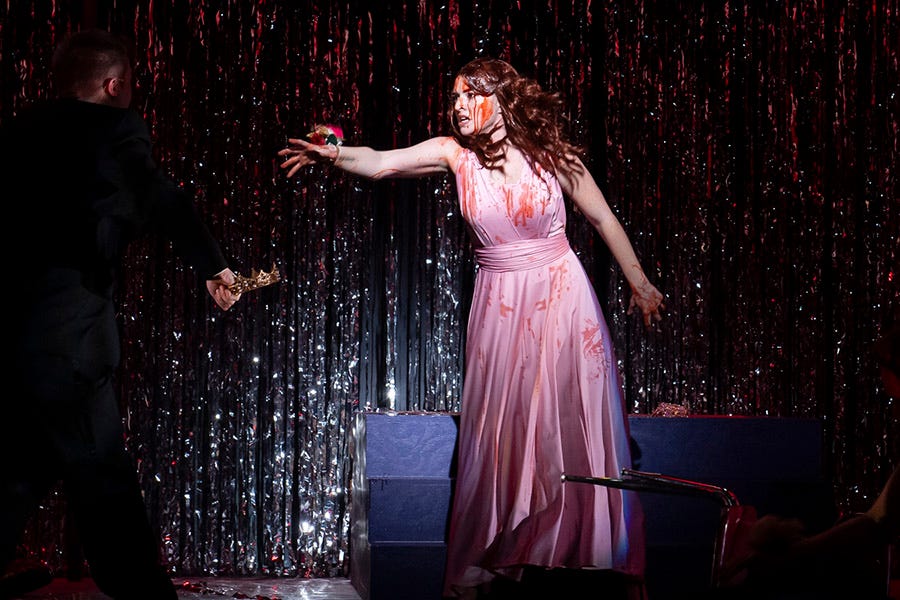REVIEW: Carrie - The Musical
A powerful portrayal that brings strength and resilience to a haunting classic.
Adapting Stephen King's Carrie into a musical is no easy feat. When the show premiered on Broadway, it faced challenges in balancing the psychological horror and tragedy at its core, and the struggle to find a consistent tone contributed to its short-lived run. Turning moments of terror and deep isolation into something that resonates in song requires a careful touch to avoid overwhelming or alienating the audience. Yet Carrie: The Musical finds a way to keep audiences engaged, transforming this dark tale into a production that’s both haunting and theatrically satisfying.
In Wright State University’s production of Carrie: The Musical, Claire Northcut’s portrayal of Carrie White is a study in unapologetic strength. From her very first lines, Northcutt’s voice leaves no room for doubt—this Carrie has an innate power that surges beneath every note. While the character may struggle with self-doubt and isolation, Northcut’s vocal delivery tells a different story, revealing a strength that feels as raw and uncontainable as Carrie’s emerging supernatural abilities.
This strength is not something that Carrie herself is fully aware of; it’s a force that has always been there, even if her character hasn’t yet learned to wield it. The pivotal moment arrives when Carrie decides to attend the prom, defying her mother’s control. Here, Northcutt’s whole body shifts, charging the character’s newfound self-awareness with a fearless clarity. In this moment, the power we’ve sensed all along finds its full expression, transforming Carrie from a hesitant girl into a young woman in command of her own story.
By not overplaying her as weak or vulnerable, Northcut’s performance redefines Carrie as someone whose strength is constant, even if she’s only beginning to understand it herself. Her voice doesn’t just convey emotion; it radiates power, making this Carrie unforgettable in her defiance and unapologetically strong from beginning to end.
While her vocal performance is a highlight of the show, there are other outstanding performances. Juliette Trumbull as Margaret, the deeply religious (and disturbed) mother to our protagonist is able to play a part written for someone twenty or more years her senior with believability. Her voice is resonant and her presence, while understated, belies something darker than we first realize. Aiden Edwards as “Tommy Ross,” is a perfect casting choice - his look, personality, and presence is about as authentically specific to the character as anyone can get. Emma Edwards is Sue, our narrator and moral center of the piece - and her failed attempts at redemption are heartbreaking. Arianna Schrage (“Chris”) and Noah Funderburk (“Billy”) shine as the villains, thoroughly unlikeable making it satisfying when they get their comeuppance. Finally, Julia DiPaolo and Orion Carter play the underwritten school personnel, and they ground the story. DiPaolo specifically has a tender moment that shows empathy and warmth, making the tragic conclusion even more palpable.
The special effects required to bring this show to life are magical, and they mostly work well. So does Jennifer Sydor’s choreography and Patrick Phillips fight scenes. Pam Knauert Lavarnway’s set, a high school gym, with sliding and flying components, gives a sense of time and place, and Matthew Benjamin’s haunting light design gives the show a rich texture. James Dunlap’s sound design is nearly flawless, even from my seat in the front row, and Zoe Still’s costumes are appropriate for the period the show is set. Matt Ebright’s music direction sounded robust and professional - and harnessed the vocal power of his principals very well.
Jamie Cordes, the director, keeps the action moving at a brisk clip, despite the need for multiple scene changes. My only qualm—and it is a major one—is that the climactic scene was partially obscured from my view due to the ensemble’s blocking. While I understand the challenge of staging for a full theater, this choice disrupted my line of sight, making it difficult to fully experience such a pivotal moment.
All in all, strong vocals, a solid pace, and the compelling storyline make this production of Carrie an achievement. Wright State’s team has taken on the challenge of Carrie’s complex tone and delivered a performance that rises above the material’s obstacles—a commendable feat that makes this show well worth seeing. You’ve got one more weekend to catch it.
CARRIE: THE MUSICAL runs through Sunday, November 17th at Wright State University’s Festival Playhouse. Tickets and more information can be found here.






